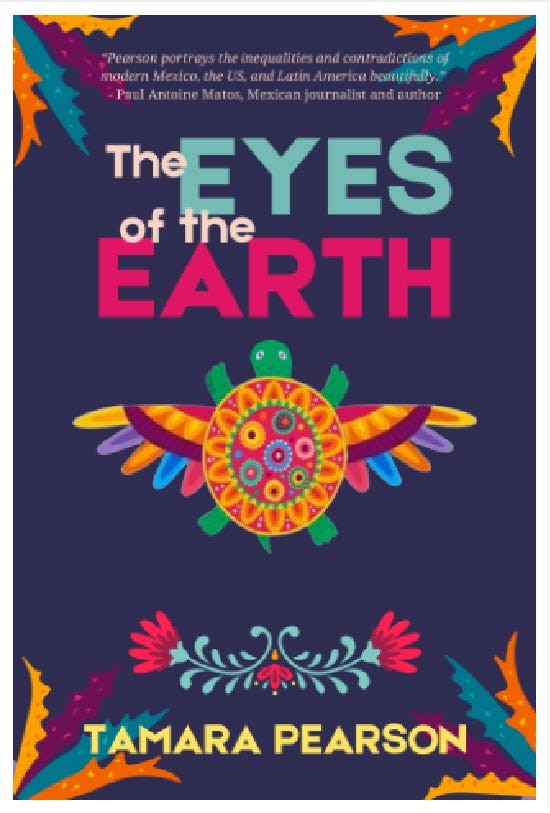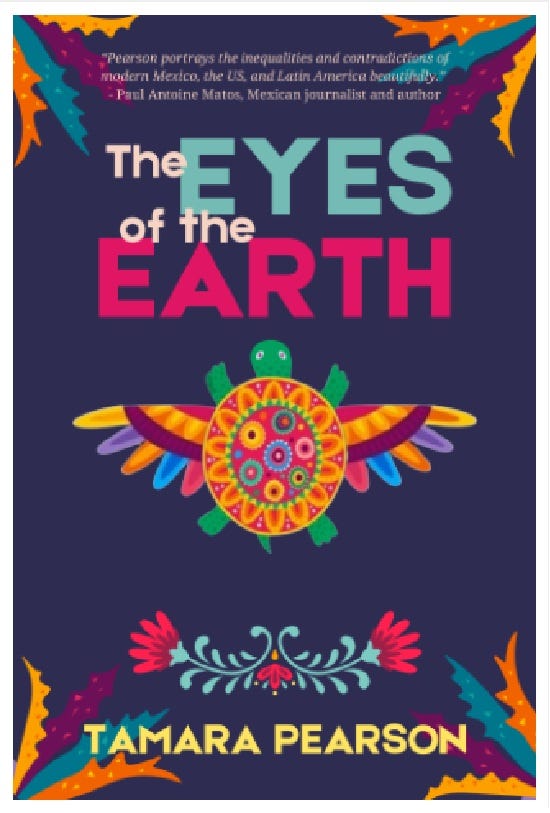The Literary Populism of Tamara Pearson
An Interview with Tamara Pearson about Her Novel The Eyes of the Earth
Tamara Pearson's recent second novel The Eyes of the Earth (Tehom – November 2024) is a landmark work of contemporary fiction — the Les Misérables of Mexico City, the hemisphere, and the globe.
What Victor Hugo's best biographer Graham Robb says of Les Misérables applies even more starkly to The Eyes of the Earth:
“The 'dangerous' aspect of Les Misérables is almost as evident today as it was in 1862. If a single idea can be extracted from the whole, it is that persistent criminals are a product of the criminal justice system, a human and therefore a monstrous creation; that the burden of guilt lies with society and that the rational reform of institutions should take precedence over the punishment of individuals.”
The protagonist of The Eyes of the Earth is no criminal — at least, not at first — merely a homeless refugee, yet she is treated in many ways as badly as, or worse than, a criminal — for merely existing.
Pearson, who has been working with a migrant shelter in Mexico City for nearly a decade, notes in Hollywood Progressive:
“The novel is magical realism — which for me is a very bold genre that ties the magical nature of humanity with the gritty realness of everyday life. But there is even another layer; that what the characters are going through is not something they face alone — there are whole social classes facing something similar. I hoped that the very short vignettes help add insight into the lives of migrants or the forces behind environmental destruction and empire’s looting, in a powerful and thought-provoking way.”
The Eyes of the Earth shows the travails and epic moments of an elderly homeless refugee from Honduras, who walks to Mexico in her eighth decade in search of a safe and secure bed in which to shelter. The novel opens:
"People could see Clementina Cardoza Olmedo, but they didn’t register that she was there. Known as La Tortuga, she was seventy-three years old, four foot ten, with two thin, white and grey plaits that descended calmly down her back. She was wearing dark grey pants with one leg folded up more than the other, and a white shirt. Her belt buckle was off-centre, and one of her draw-string backpack straps had scrunched up the top of one sleeve. She had no frills. She wasn’t a show."
She is humanity, writ large. And this special novel illuminates her reality and the contemporary world as well as any work of the imagination possibly can:
“The time had come for the beasts of the System of Monsters to hold their exclusive meeting. The people squashers, wing pluckers, blood suckers, Ophicordyceps beasts, rubbish ranters, pain exploiters, and land rapists arrived at Davos in private jets. They were joined by the racketeer kings that ran the banks, the soul stealers who trafficked in humans, the producers of efficient death machines who induced wars in order to sell arms, and the slow poisoners who sold junk food and junk drinks. The fossil fuel and oil beasts were the second last ones to arrive. Their tyre bodies slushed about with petroleum, obscuring their suits, and noxious gases billowed from their mouths when they spoke.”
La Tortuga presses on:
“Heroism percolated slowly. It gained momentum over decades. In La Tortuga, with each act of integrity, each hard decision and moment of generosity, neuronal changes occurred within her, and she gradually metamorphosed into someone very strong and capable. But on the outside, her eyelids were thin and falling, her legs were swollen, and her bones were losing calcium and becoming more and more brittle.”
Our hero Clementina Cardoza Olmedo, our humanity, is more powerful than may appear and will not be stopped. La Tortuga embodies, the novel embodies, Tamara Pearson embodies a contemporary and eternal progressive and revolutionary populism of great power and determination — vibrant and brilliant. The novel is an inspiration and a model. It deserves a wide readership and reproduction in other forms that can help convey the story of our times and help motivate and show ways forward.
Q & A With Tamara Pearson About The Eyes of the Earth
TC: How long did you work on the novel?
TP: 7 years.
TC: What is your purpose and motive for writing the novel?
TP: I wanted to challenge ideas about the origins of poverty in the Global South and create potent, memorable new symbols for the trauma of imperialism and the crimes of capitalism — that help us see them in a new (or alternative) way. I wanted to humanise migration and counter sexism and ageism with a powerful, incredible old woman protagonist, and to de-normalise injustice, especially in the Global South (where the media narrative is that news here doesn't matter and nor do we).
TC: What was the inspiration for this story — anything in particular?
TP: I was just massively inspired and moved by my surroundings, as well as by the migrants I got to know through my ongoing collaboration with a migrant shelter and the migrant rights movement.
TC: Form and style aside, do you consider yourself to be a particular kind of literary novelist? Anti-capitalist, anti-empire, socialist, or so on?
TP: Critical and hopeful. I only hesitate to use labels because people's understanding of them differs. There's also a deep-seated belief that nothing we do should be political or attempt to change things. But art is automatically political, because it is expressive. It justifies and celebrates the status quo, it puts the spotlight on people who are already privileged, or it expresses concern about something — minor or major. I definitely want to challenge the status quo, and my writing is very political, but also artful — I hope.
TC: How did you settle on the occupations of fixer for La Tortuga and busking magician for Harry?
TP: Oh gosh, I can't remember, but La Tortuga is clearly a fixer as her job, but also metaphorically. Activists and those striving for a better world, are, at a deep level repairers — of injustice. But in a consumerist world, we also just need to repair a lot more, and buy less. Harry is a magician because his magic relies on buying gadgets, and so it contrasts with the more real magic that La Tortuga does, and helps us to question what magic is. As if the way a seed grows into a giant tree, isn't magical?
TC: Any thoughts on similarities or differences between this novel and your first one?
TP: I just think I've learned a lot, improved and focused the plot and themes more, and the setting has shifted countries as I have.
TC: What feature or features of each of your two novels do you value most?
TP: I think, or hope that The Eyes of the Earth conveys Mexico with the intimacy I feel for it — both the troubles and the beauty. It's very bold and harsh and real with what is messed up with the world, and I think that's necessary. I think the climate crisis and inequality and so on are far too urgent for subtlety. But, there are nuances of humanity that deserve gentle treatment, and I hope that I do that too — looking at conditions like exhaustion and loneliness.
TC: Do you have touchstones or favorite novels, movies, or TV series?
TP: So many — I really love Ben Okri's imagination, the writing skills of Arundhati Roy and Joukhadar, and the brevity and powerfulness of Eduardo Galeano. Okri's The Last Gift of the Master Artists really flips how we have been taught to perceive Africa just prior to slavery and therefore, how much was lost to that.
TC: How has your life and work fed into and informed your novels?
TP: As an activist and journalist, I want to research things to death and get to the bottom of things. So I want to include a lot of context in my novels — the 'why' behind what the characters are going through. I'm aware that I have to be careful with that — with fiction you want to give readers space to arrive at conclusions on their own. Give them clues and let them decipher, show not tell and so on. Still, I really enjoy contrast — between main characters, between settings. And in life, I've been through some really traumatic things, and I hope that helps me convey characters with deep sensitivity.
TC: Your sense of the value and effects of imaginative lit?
TP: Literature is extremely important and extremely undervalued. We need lots of different types of writing and expression (news, investigative journalism, debate, podcast interviews etc), but literary fiction is unique in that it goes beyond the day-to-day experiences, to the most profound, long-term human experiences. We need the news on the latest Trump policy or the latest M23 advancement in the DRC, in order to understand the world now and to take action. But, literature is about the essence of what we are doing with life. It is our empathy for humanity or the Global South or workers etc, our understanding of colonialism, and it can be extremely hopeful. Because humanity — often lost, confused, apathetic, bombarded by social media, bored with retail consumerism — has within it the basic characteristics like creativity, care, awareness — that are the toolbox for change. Literature helps us remember that, see that. It brings us back to the most important things, while taking us on a story and journey to really see them. Literature can provide us with the broader perspective necessary for doing those more daily things.






Brava.